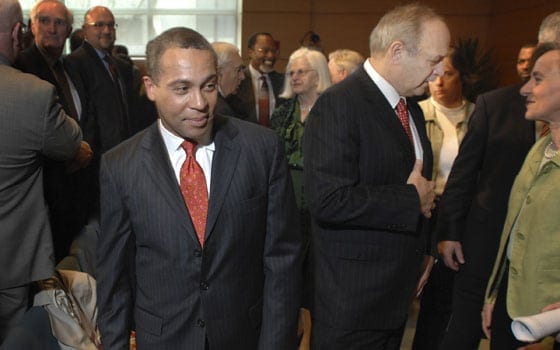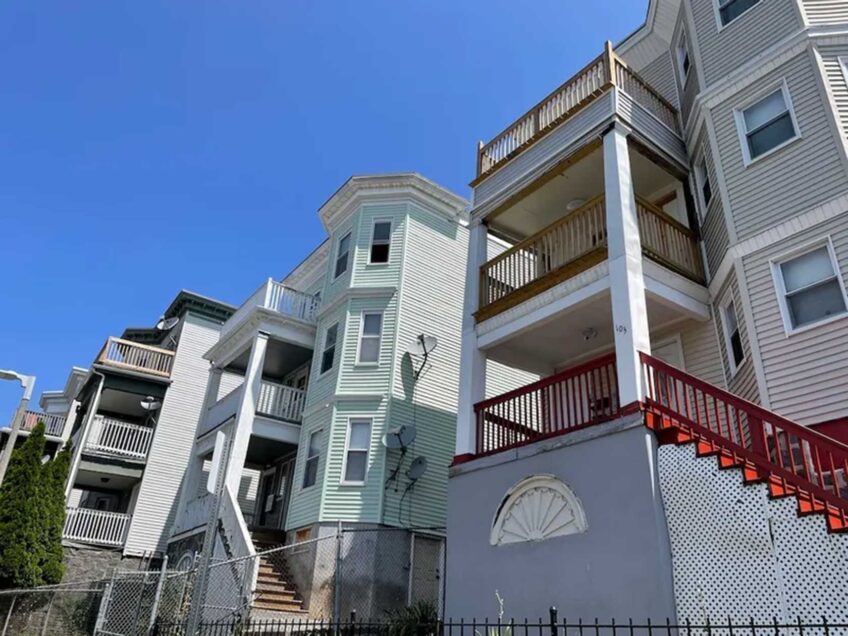
Former House Speaker Salvatore F. DiMasi and three associates were indicted Tuesday on federal charges alleging they conspired to help a software company win $20 million in state contracts and conceal money they got from the company.
DiMasi, who resigned in January from one of the three most powerful jobs in state government, proclaimed his innocence as he and the others were arraigned in U.S. District Court.
“Every decision I made as speaker and as a state representative was made in the best interests of my constituents and the people of the Commonwealth,” the Boston Democrat said in a statement.
In a 33-page indictment handed up by a grand jury, DiMasi is accused of eight counts, including conspiracy to defraud the federal government, mail fraud and wire fraud.
His friends and business associates — Joseph Lally, Richard McDonough and Richard Vitale — were indicted on identical charges, with Lally facing an additional count of money laundering.
Vitale’s attorney, Martin Weinberg, said his client was innocent, adding: “He conformed his conduct to the law in all respects.”
Thomas Drechsler, an attorney for McDonough, said his client denies any wrongdoing and has “practiced the lobbying profession in an honorable and exemplary manner for over 30 years.”
Lally’s attorney wasn’t immediately available for comment.
The indictment alleges that DiMasi first used his position as the leader of the House to help the company, Cognos LLC of Burlington, win a $5.2 million contract with the state Department of Education in 2006. It alleges DiMasi later helped Cognos win a $15 million software contract with the Executive Office of Administration and Finance.
“It’s about time we got business like this,” the indictment quotes DiMasi as saying after a fellow attorney told him about an initial meeting between Cognos, Lally and McDonough.
Gov. Deval Patrick’s administration ultimately canceled the larger contract, and Cognos refunded the money to the state.
Cognos isn’t charged with any wrongdoing, and prosecutors say the company is cooperating with the investigation.
The indictment alleges Cognos paid an attorney who shared office space with DiMasi $5,000 a month, beginning in April 2005, and that attorney — who was not named — gave $4,000 of it to DiMasi as a “referral fee.” DiMasi received a total of $60,000 by December 2005, according to the indictment.
The indictment says that in 2006, DiMasi “caused a budget amendment to be introduced and facilitated its final passage” for the first $5.2 million Cognos contract. Lally allegedly was paid $891,000, and he, in turn, paid McDonough and Vitale $100,000 each, according to the charges.
Vitale has since pleaded not guilty to state charges for allegedly concealing work he did with DiMasi to assist ticket brokers with anti-scalping legislation passed by the House but defeated in the Senate. Those allegations weren’t included in the federal indictment.
The indictment says that in 2007, DiMasi used legislative language provided by Lally, McDonough and Vitale to include provisions for the $15 million software contract in a state capital bond bill. After that bill passed, the indictment alleges, DiMasi also ensured the contract went to Cognos.
Afterward Cognos paid Lally $2.8 million and he, in turn, paid Vitale $500,000 and McDonough $200,000, the indictment alleges.
The grand jury charged the group with mail fraud for letters mailed between Cognos and DiMasi’s office mate, as well as Vitale’s accounting office and DiMasi’s Statehouse office.
The wire fraud charges are related to e-mail messages, one of which allegedly was sent from McDonough to Lally on June 30, 2006, with the message, “Mission Accomplished.”
The money laundering count against Lally stems from allegations he transferred more than $10,000 — the legal gift limit — between the parties.
The indictment not only seeks the forfeiture of DiMasi’s condominium in the North End, but Lally’s North Reading home, various bank accounts held jointly with his wife, as well as a 2006 Boston Whaler boat.
(Associated Press)





